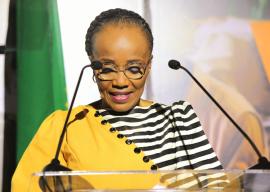
Minister in the Presidency responsible for Women, Youth and Persons with Disabilities, Sindisiwe Chikunga, has underscored the need to localise gender-responsive value chains and ensure the full and equal participation of women in the economy.
“Localising gender-responsive value chains require a clearly articulated infant industry development strategy. When one examines how parts of Asia became the manufacturing hub of the world, the literature is clear: their governments have been a patient investor of first resort, with a much higher risk appetite than their private sector,” Chikunga said.
The Minister was speaking at the 3rd Annual Women Economic Assembly (WECONA), held in Modderfontein, Johannesburg, on Friday.
WECONA is at the forefront of driving a gender-equal economy, bringing together influential business leaders from a variety of sectors.
It serves as a powerful platform dedicated to advancing women's economic empowerment, fostering collaboration, and sparking deliberate, meaningful action.
Leaders from industries, including finance, technology, and manufacturing, unite to share insights, tackle key challenges, and advocate for policies that drive change.
Delivering her keynote address, the Minister emphasised the need for bold, measurable, and accountable actions aimed at transforming South Africa’s supply chains.
She said WECONA needs to urgently study the anatomy of government expenditure, as well as supply chain patterns of every product and every service that has and continues to be procured.
She stressed the need to break free from the monopolies that entrench barriers to market entry and reimagine a women-led industrial and productive revolution adding that “no sector should be beyond our reach.”
The Minister also emphasised the need to contend with ways to introduce supplier diversity policies in procurement guidelines that formally mandate the engagement of women-owned suppliers.
“Thirty years into our democracy, we now know that the mere presence of laws does not translate into their implementation, let alone our lived realities. More work needs to be done. We need enforcement powers that come with the ability to monitor, evaluate and ensure accountability in the implementation of the act.”
Capacity building
The Minister further highlighted the need to modernise and build the capacity of women owned businesses, through access to the latest manufacturing technologies and production equipment, to ensure that they produce, supply, and distribute the best quality of goods and services.
“In highly regulated sectors, we need to find ways to simplify the certification process and provide assistance with obtaining certifications needed to bid for public contracts. Without dedicated and tailor-made financial support, we will be setting up women for failure.
“We need to work with both established and emerging financial institutions to provide women-owned businesses with access to credit, grants, and low-interest loans. Some governments have set up funds specifically to finance women-owned businesses participating in public procurement, without this instrument failure is almost guaranteed,” the Minister explained.
She said delayed payments remain one of the most potent killers of women owned businesses.
Women’s Empowerment Working Group
Meanwhile, with South Africa's G20 Presidency well underway, Chikunga said she is looking forward to seeing the participation of different streams of WECONA at the Women’s Empowerment Working Group.
The working group has put forward three priorities for consideration by G20 nations and beyond. These include policy perspectives on the care economy, promoting financial inclusion of and for women, and addressing gender-based violence and femicide (GBVF).
“In each of these priority areas, we intend to establish G20 Legacy Projects that will not only outlive our G20 presidency but also reach ordinary women who are normally not part of G20 proceedings,” she said. – SAnews.gov.za


